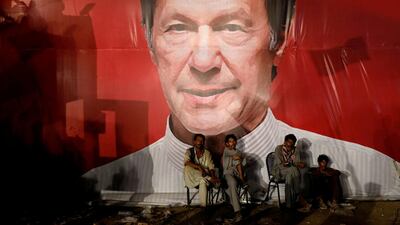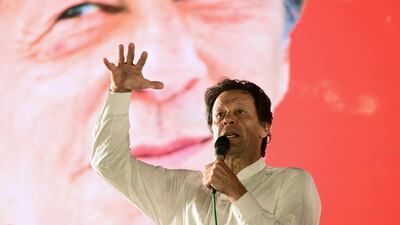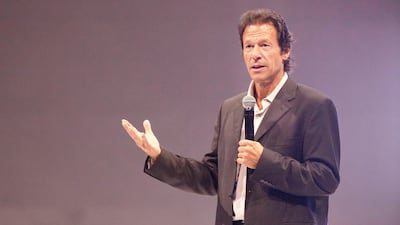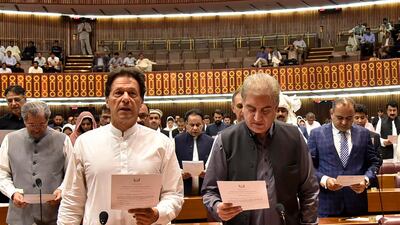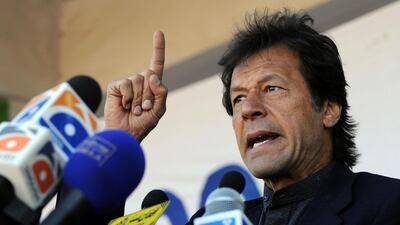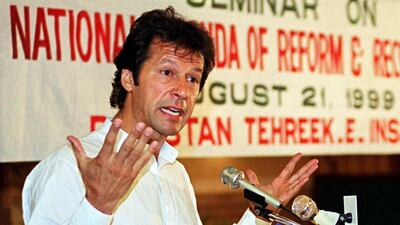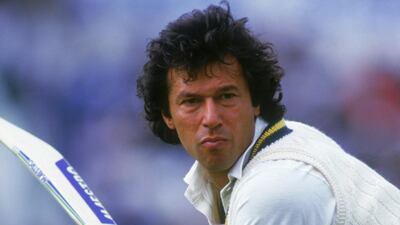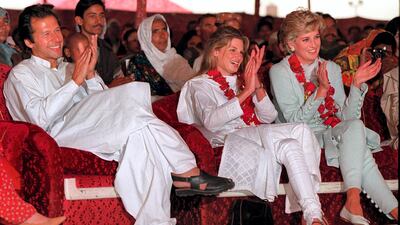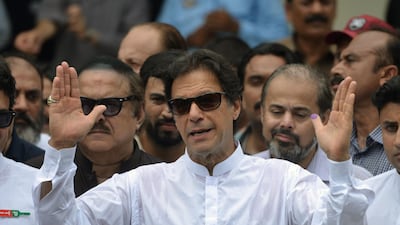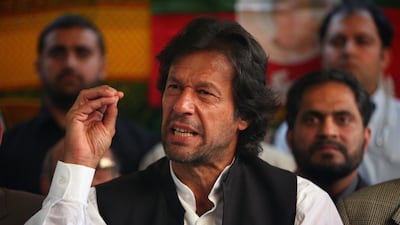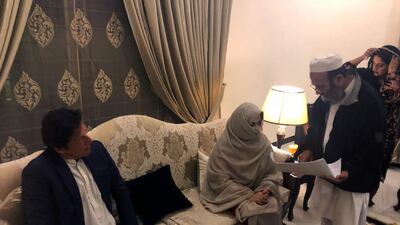When Imran Khan is sworn in as Pakistan's prime minister on Saturday, he is expected to eschew the newly made ceremonial coat usually worn at such inaugurations.
Instead, he will wear an old sherwani. According to his tailor, the former cricketer "wants austerity to prevail at all levels, starting from him as a person".
Along with a simple ceremony lacking foreign dignitaries and show business friends, his oath-taking is intended to symbolise the start of a new Pakistan, far removed from the prior excesses of the country's political elite.
Yet as the cricket hero-turned-populist statesman takes office, analysts say he must quickly pivot to problems that need more than symbolism to fix.
In the early months of his premiership, he will contend with desperate economic woes, ongoing militancy and is likely to try to rebuild fragile ties with America.
At home, he must also live up to the expectations of his followers who he has promised an Islamic welfare state.
Mr Khan, 65, inherits an economic situation which his own finance minister-in-waiting has described as "dire".
Dealing with it will be his first priority and one that is likely to overshadow all other tasks.
His July 25 election win capped a long struggle for political power, but the country's central bank reserves are near nil and the current account deficit is running at $2 billion (Dh7.35bn) a month, up from $2bn a year in 2013.
Pakistan is believed to urgently need around $12bn to get out of its immediate crisis.
Finding it will colour not only the first weeks of the new prime minister's domestic policy, but also his foreign policy, said Dr Farzana Shaikh, a Pakistan specialist at the Chatham House think tank.
"His foreign policy vis-a-vis some of Pakistan's big backers is going to be determined by how they can help Pakistan sort out its economic crisis," she said.
Mr Khan has reportedly already had three separate phone conversations this week alone with the rulers of one potential financial rescuer – Saudi Arabia.
The kingdom's Crown Prince Mohammed bin Salman has assured Pakistan that it wants to invest heavily to strengthen trade ties. A visit to Riyadh, as well as a trip to Tehran, has already been accepted.
Loans from China offer another option, and the country is reported to have assured Pakistan's incoming government that it can help.
Mr Khan's fall back position is a bailout from the International Monetary Fund, but seeking help from the Washington-based body could force him to address another pressing issue – Pakistan's fraught relations with the United States.
____________
Read more:
Beyond the Headlines podcast: Who is Imran Khan?
With Imran Khan yet to take office, poll protests start in earnest
A political winner at last, Imran Khan begins Pakistan coalition building
____________
Ties have been at a low since President Donald Trump used his first tweet of 2018 to lambast Pakistan's "lies and deceit", then slash aid.
Mr Khan's long-standing anti-US rhetoric on issues such as drone strikes may not put him in an easy position to build bridges. His impulsiveness may also not mix well with President Trump's unpredictable Twitter edicts.
Dr Shaikh said Khan was "not a very well-known or indeed well-liked commodity in Washington, so he's really going to have to go the extra mile".
Without the prime minister moving "decisively" to patch up relations with the United States, Pakistan will find it very "difficult to make a case before the IMF", she said.
Any IMF bailout could also come with uncomfortable strings about disclosing the terms of existing loans from China.
Mr Khan has spoken of resetting relations with India, but there he is beholden to the country's military, who dictate national security policy. Few think he will challenge the generals on India or Afghanistan soon, meaning policy is unlikely to change.
Domestically, financial worries will force him to review state subsidies to loss-making public industries. "He's going to have to make some very difficult decisions," said one western diplomat.
Mr Khan has already laid out what he wants to achieve in his first weeks. In the optimism of the campaign trail his Pakistan Tehreek-e-Insaf (PTI) party set out a bold 100-day agenda for reform.
_____________
Opinion:
Will a new dawn for Pakistan mean a shift in relations with India?
_____________
It included splitting the populous Punjab province in two, an emergency aid package to reduce crime and poverty in Karachi and declaring an agriculture emergency to revamp the water-starved farming sector.
Perhaps his most ambitious campaign promise was the touting of an Islamic welfare state. Reconciling these big spending promises with an economic crisis and an army that gets about a fifth of the government budget will be one of the new government's biggest difficulties.
"Imran Khan has given rise to the expectations of the people and how do you meet those?" Gen Talat Masud, a former senior army officer and political commentator, said of the incoming premier's relentless attacks on the incompetence and greed of politicians. "How is he going to make sure his supporters don't just end up saying: 'You are the same as the last ones?'" the retired general added.
